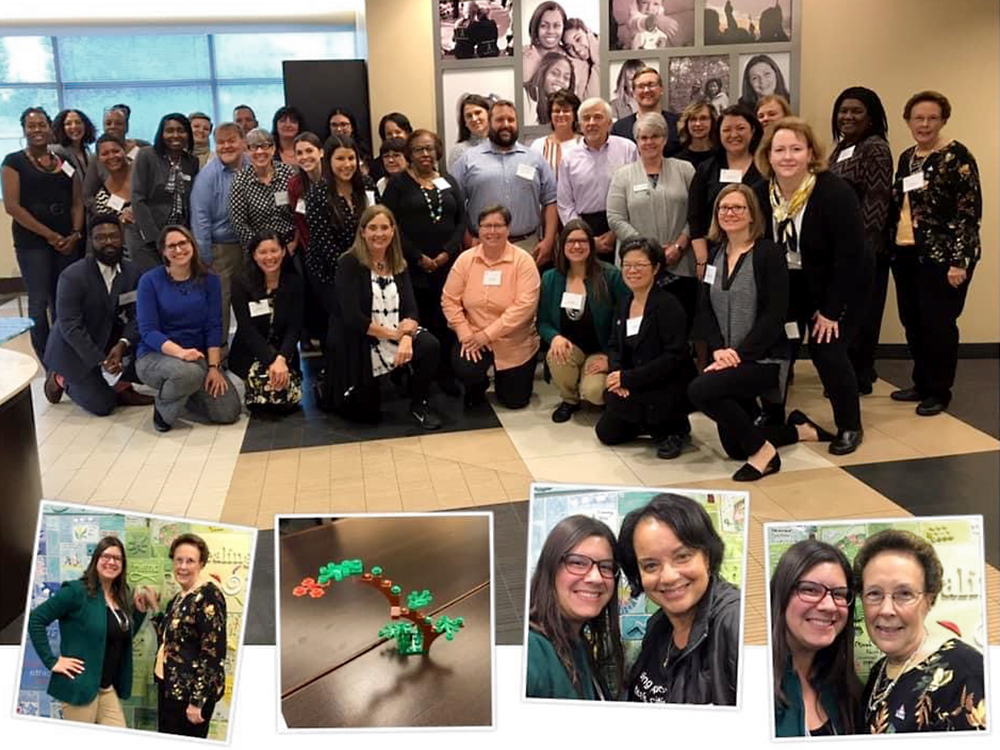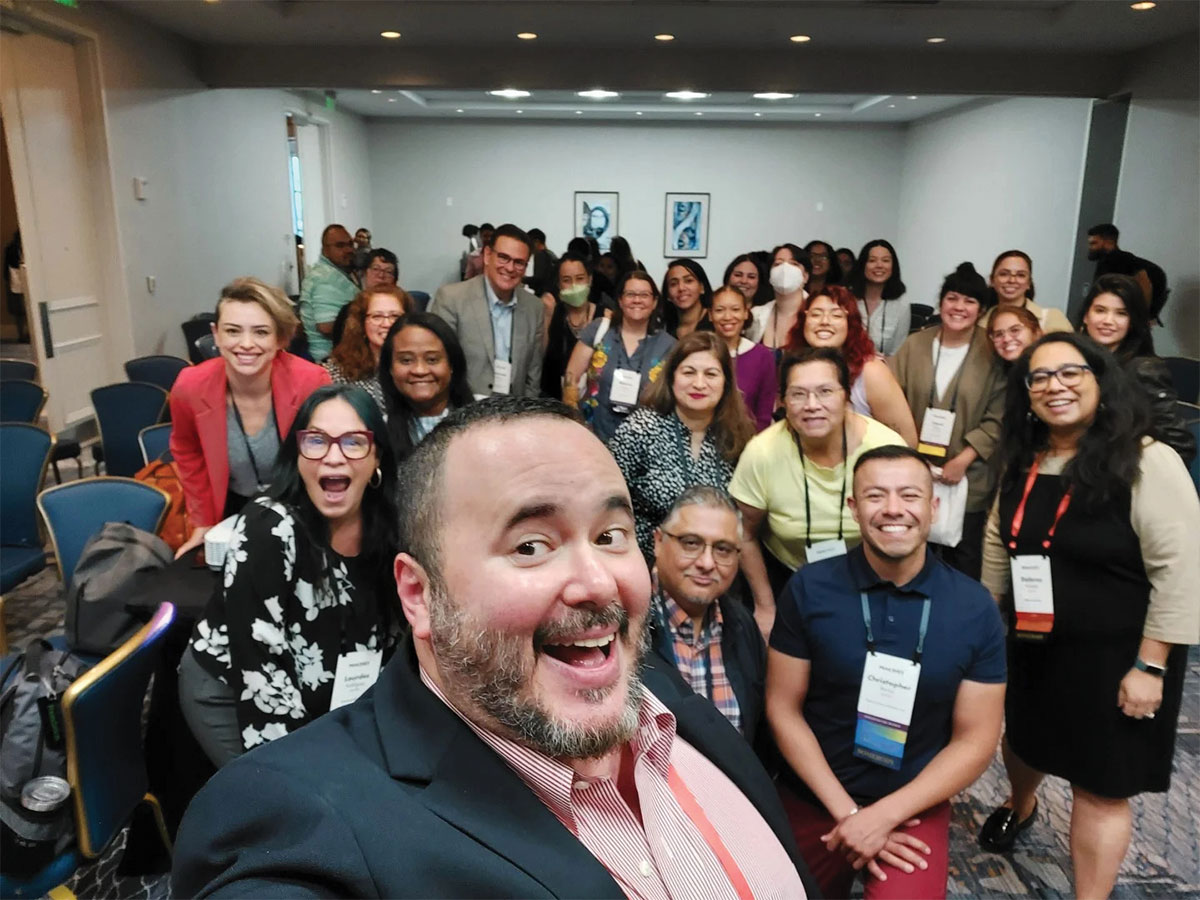
At the 2023 Volunteer Leadership Summit, the PEAK community was inspired by the wisdom of CarolLaine M. García, PhD, a Holistic Leadership Coach, Writer, and Speaker who spent the pandemic years reinventing her mindset and reorienting her life’s purpose. Her three-year journey of self-transformation, following an unexpected exit from the corporate world, was backed by her graduate studies on mentorship and what she gained while reading 260 books covering spirituality, biology, physics, trauma, “and just everything, because I wanted to understand: How did we get here as humans?”
What she learned, and how she grew, set the stage for a compelling talk on the power of comprehensive self-care—or, as García put it, self-adoration—to turn anyone into a true leader in all aspects of their lives.
Below, find just a few of the highlights from her discussion, covering the value of self-adoration, nine practices to invest in, and how to start creating sustainable habits with them. Quotes have been lightly edited for brevity.
What leadership is
García proposed that leadership does not spring from authority. “If someone says, ‘You have to do what I say because I’m your boss,’ that’s a manager, not a leader. Leadership is a feeling. A leader is someone who inspires you to go beyond yourself to do something that is in line with a vision that maybe you can’t see yet.” And the core of that feeling is trust. “If there’s no trust when you’re asked to follow someone into the unknown, why would you follow them?”
The qualities that make a great leader—those that establish trust and inspire people to follow and grow—are all about relationship building and how you invest in others. But first, a leader must focus on how they relate to and invest in themselves. “It is impossible to be authentic with someone else when you don’t know what authenticity means to you,” García said.
So how does one develop relationship-building leadership qualities such as authenticity, empathy, adaptability? You need to cultivate self-leadership. “Taking care to develop yourself in a holistic way that ultimately amplifies your impact.” That’s the idea behind self-adoration.
What keeps us from leading
García commiserated with the audience on the challenges we each face and the unique nature of those challenges for each of us: “It is so hard to human with other humans because we all have different ideas about how things should be. Figuring out how to get on the same page is a task, right?”
Among the more universal challenges people face, she cited the fear of failure and the fear of success; the feelings of burnout and being overwhelmed; imposter syndrome and the four Ps that go along with it: perfectionism, procrastination, paralysis, and people-pleasing.
The antidote she proposes is self-adoration, a process that leads to self-knowledge: understanding your feelings, the false narratives that get in your way, and the value you bring to others.
“One of the mind tricks I learned was this definition of confidence: Trusting that when someone has an interaction with you, that they will be better for it.”
In relation to her own struggle with imposter syndrome, García said, “I got into a mindset of telling myself: If I trust that what I’m going to say as a speaker is going to make somebody a better person, then I need to get as many people into this room as possible.” That belief led her to reach out to more people, which in turn amplified her impact.
Nine practices of self-adoration
“I named it self-adoration because it is meant to be provocative,” said García. “Some people react by saying, ‘Oh, I don’t want to adore myself.’ My hope is that when you see what it is, you’ll find that it’s not a super radical idea. It’s taking care of yourself.”
It’s natural, she said, to feel that self-care is selfish because of the cultural messages we hear so often. “I argue it’s the opposite. If you don’t take care of yourself, someone’s going to have to take care of you,” she said. “And isn’t that selfish? By expanding yourself, you are expanding your reach to others. The capacity you create within yourself relates directly to what you can do with other people.”
These practices are important because “they all lead to those things that make a great leader.” Not only do they elevate your understanding of yourself and your ability to be authentic, empathetic, and adaptable, said García, “they set an example for the people around you.”
The nine areas García outlined, and some habits to pursue for each, are as follows.
- Physical: “Move regularly, eat a balanced diet.”
- Intellectual: “You cannot be a leader, an innovator, a creative, without learning. There’s way too much change every single day: You have to teach yourself new things.”
- Emotional: “Figuring out how you feel.”
- Social: “Nurturing relationships, and building a supportive network, are important for your wellness and your success. Because you cannot get anywhere high by yourself.”
- Financial: “If you don’t have a good sense of financial wellness—a basic sense of how to budget—how can you create abundance?”
- Environmental: “Create a space that invigorates you, that is conducive to who you want to be. In my office I have books with titles that encourage me, plants that remind me of nature, color that allow me to feel.” That goes for online spaces too: “I changed my LinkedIn headline to say what I wanted to be—speaker, writer, coach—before I became it.”
- Recreational: “Making time for fun is a wonderful way to reconnect to your passion. Playing with the world taps into your inner child and that part of us that is enamored to be on Earth.”
- Spiritual: “Spirituality is being in touch with who you are internally, the things that people cannot see. Think about yourself: Who am I? What is life? It’s wondering, it’s curiosity.”
- Energetic: “Think about yourself as a high-value person. The likelihood of you being born is one in 400 trillion: It’s almost impossible that each one of us is alive, and yet here we are. If you believe that you are a treasure, you will protect that treasure, and you will seek joy.”
Ideally, you should be practicing self-adoration daily in nine different areas on a regular basis by making them habitual. In particular, you should covering the basics—the first three areas—every day: “There should be physical movement every day. You should be learning every day. You should be figuring out how you feel every day.”
And when you add in the other practices, you are on your way to building a highly effective version of yourself that’s primed and ready to lead. “If you take something from these nine habits and do them on a very regular basis, it will change your life 1000 percent. You’re going to be unrecognizable in a year.”



